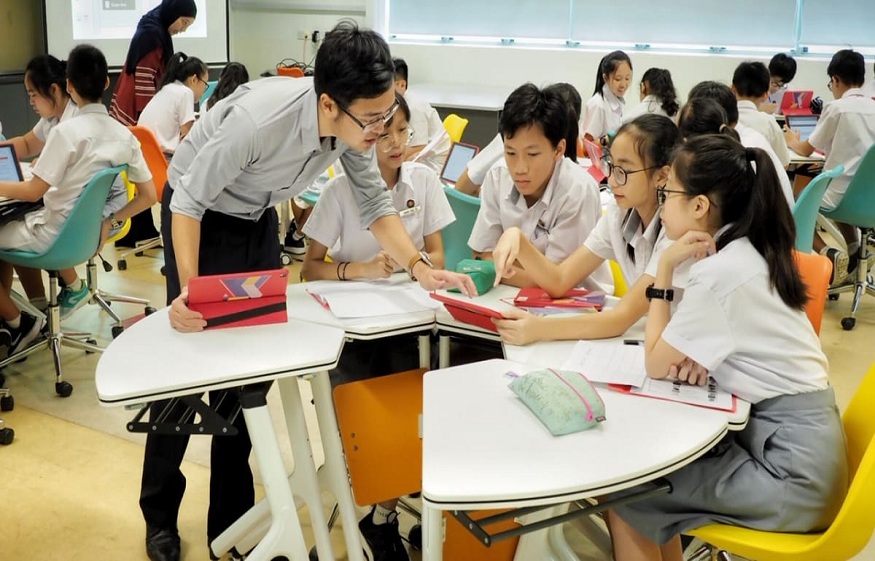This is an article that has gone around the world: the Singapore method, as far as mathematics is concerned, is miraculous. And allows incredible results*.
But what many people don’t know is that the Singapore school system is very competitive. In Asia, education remains a value and success at school is essential for many families.
National Gallery in Singapore
Like what is happening in Japan or South Korea, students are put under pressure, not only by the school system, but also (often) by those around them.
Singapore has a system that produces excellent results (which the media talks about a lot) but also has a lesser known side (which the media sometimes overlooks).
The weight of the PSLE
4 letters that terrorize families in Singapore. PSLE stands for “Primary School Leaving Examination”. It is one of the most important exams in Singapore and it takes place at the age of twelve.
The success rate is over 97% but the challenge lies elsewhere. The goal is to get the best score possible. Depending on your result, you have access to the best schools on the island. But above all, your schooling is greatly influenced by your PSLE score.
The Prize for Excellence: The Dark Side of Education in Singapore
In addition to access to “good” establishments, two-thirds of the “best” students will have access to the express stream which allows them to complete the secondary school program in 3 years.
The next 20% will do the same program, but in four years. harmless? So ask the parents who will have to pay 4 years of schooling instead of 3 years for most families.
As for the remaining 10%, they will be oriented towards the “Technical Course”. No matter how hard the government tries to portray it in a different light, for many parents in Singapore this amounts to a dead end.
The obligation of private lessons
98% of students have used private lessons at least once during their schooling. The market for private lessons and “Tuition centers” represents 1.1 billion dollars per year in the City-State.
De facto most students attend classes after class to prepare for exams. Education is a business that is doing very well in the City-State.
Just walk around any mall in the city to see these famous malls. These are in full expansion (more than 850 on the island) and recruit teachers at exorbitant prices, which brings us to the next point.
The shortage of school teachers
Why become a teacher in a school if you can become a teacher in a tuition center. Or better: private teacher.
Most future teachers already give private lessons to finance their studies. And they therefore already see the advantages and disadvantages of this type of work compared to that of a professor in a public establishment.
SMU School of Economics
Fewer students, often better off, fewer lessons to prepare, fewer parents to manage… But above all, a lot more money (even if it’s not banker salaries either) and requirements for results .
Why a shortage? Because it is forbidden for a teacher of the Ministry of Education (MOE) to give more than 6 hours of lessons per week. As a result, many teachers take the plunge and become a private teacher or in a full-time Tuition center.
This is not without posing many problems. An equation that the government has not yet resolved .
An unknown suicide rate in Singapore
October 21, 2016, an eleven-year-old boy committed suicide by jumping from the 17th floor of his apartment building . The reason ? His average test scores.
This drama marks a turning point in Singapore. This is one of the first times the city media have reported on a student’s suicide. Suicide is a taboo subject in Singapore. The suicide of children because of school pressure is even more so.
Paris-Singapore office
There are statistics on everything in Singapore. Except on delicate subjects: suicides, poverty, etc. So there are a lot of rumors but in the absence of stats it is difficult to draw lessons.
Gossips will say it’s because the numbers are overwhelming for the government. In the absence of stats I prefer not to advance on the subject. However, the situation does not appear as dramatic as in South Korea or Japan.
What future for Education in Singapore?
Singapore’s education system is regularly cited as an example for the results it produces. And indeed it produces very good results and is probably one of the best in the world (PISA & cie ranking).
However, it is not perfect either. The desire to sort and group students according to their level, from the end of primary school, is commendable. This has advantages, but some students may feel left out and not all families can afford tutoring.
Singapore’s financial center
The Singapore government is aware of the weaknesses of its system and is trying to remedy them (non-publication of the best scores of the PSLE, revision of quotas for teachers, establishment of bridges between courses, etc.).
But as in France, the subject is very complex. And the slightest change gives rise to litanies of complaints from parents. Sensitive subject ? Definitively

